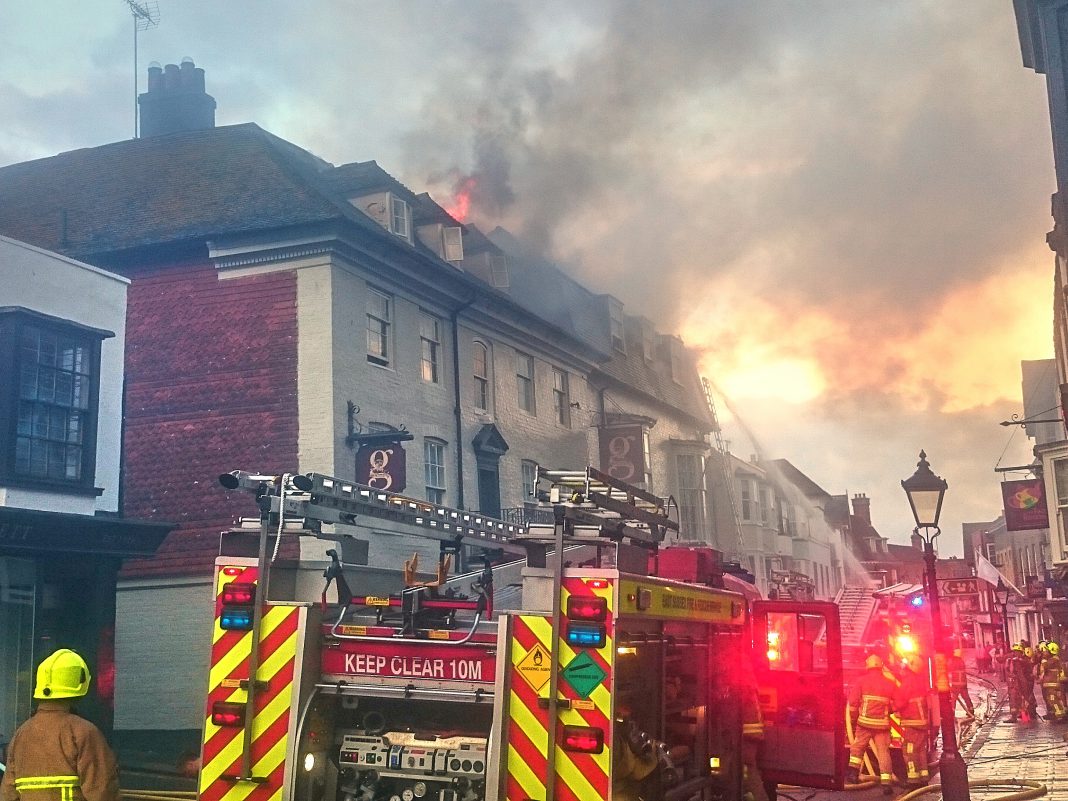Editor’s note: The following letter was received just before Rye News was going to be published on Thursday evening.
On Saturday Rye will be crowded for one of its busiest nights of the year, with many visitors, and the Bonfire Night procession will pass The George and everybody will see for themselves the state it is in.
The writer raises important issues and questions which our councillors – both the Rother District councillors (who have planning responsibilities) and Rye Town Council – should be urgently seeking answers to.
David Wylson writes: “The practical rather than emotional response soon after the fire on the 20th July should have been the application of temporary tarpaulins to the damaged roof areas of the George.
“Instead of drying out before the end of the summer this historic timber framed building has been left open to the elements for nearly three months of relentless, saturating heavy rain. Old plasterwork, Georgian panelling and doors, oak beams and original floors will have suffered significant and possibly irreparable additional damage.
“I am now appalled to see that the mathematical tilework is beginning to buckle off the front elevation to the High Street. All this at the heart of the Rye conservation area.
“I understand the Georgian Group and the Society for the Protection of Ancient Buildings have written to Rother District Council expressing their serious concerns. The advice set out by Historic England in “Stopping the Rot: A guide to Enforcement Action to save Historic Buildings” (2016) is explicit.
“Several questions need to be answered.
“Who are the architects/engineers responsible for advising the owners “that the water damage that was sustained during the fire means that the current wet weather is unlikely to do any further harm”?
“Why has the Local Planning Authority not used its Section 54 powers to ensure temporary protection of the building?
“Given the assurances in the recent press release, the full repair scaffolding should have been erected by the time this letter goes to press.”
Image Credits: Rye News library .




There is something not right here.
The insurance assessor would have demanded that scaffolding was immediately erected and covered with corrugated sheeting (tarpaulins would be of no use). With any insurance claim the policy holder is obliged to prevent the damage getting worse.
What is going on?
I agree with the previous comment by Martin
There is something not quite adding up.
My suspicions are the building was inadequately insured.
Hopefully I’m wrong and that they will soon be underway to repair the damage.
We appreciate your continued interest in the George and can only reiterate our previous comments that the process is going as quickly as possible with the full support of our insurance company and expert professional team.
I share Martin Carter’s comments. If the building and it’s contents are/were adequately insured then the insurers concerned would have a financial interest in preserving the contents by insisting that what is known as “a tin hat” (i.e.an angled corrugated iron roof) be erected immediately after the fire. The fact that this hasn’t happened together with signs of other repair activity must throw doubts on whether the building had any viable insurance cover at the time of the fire.
John Jessup